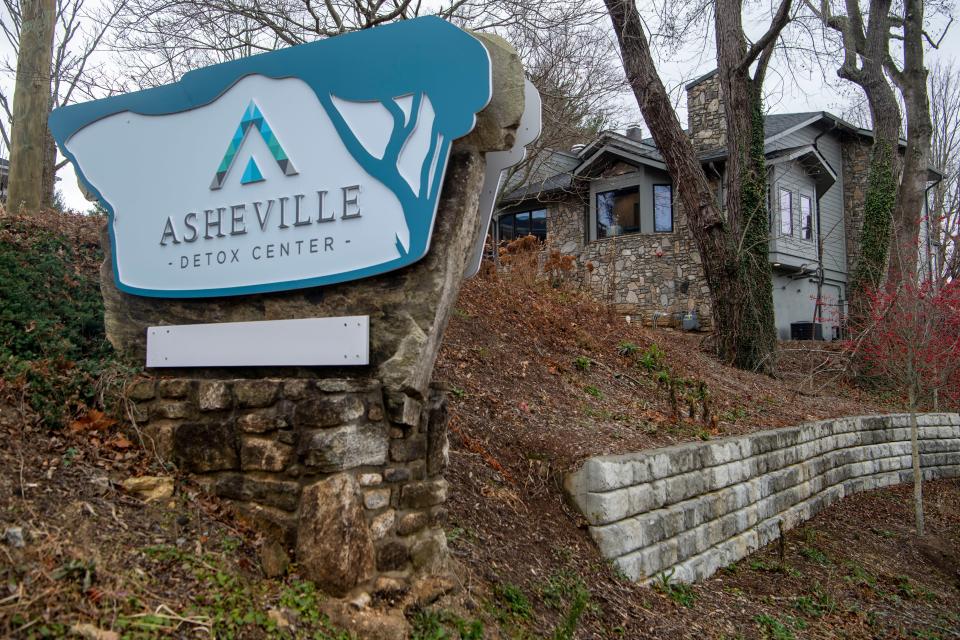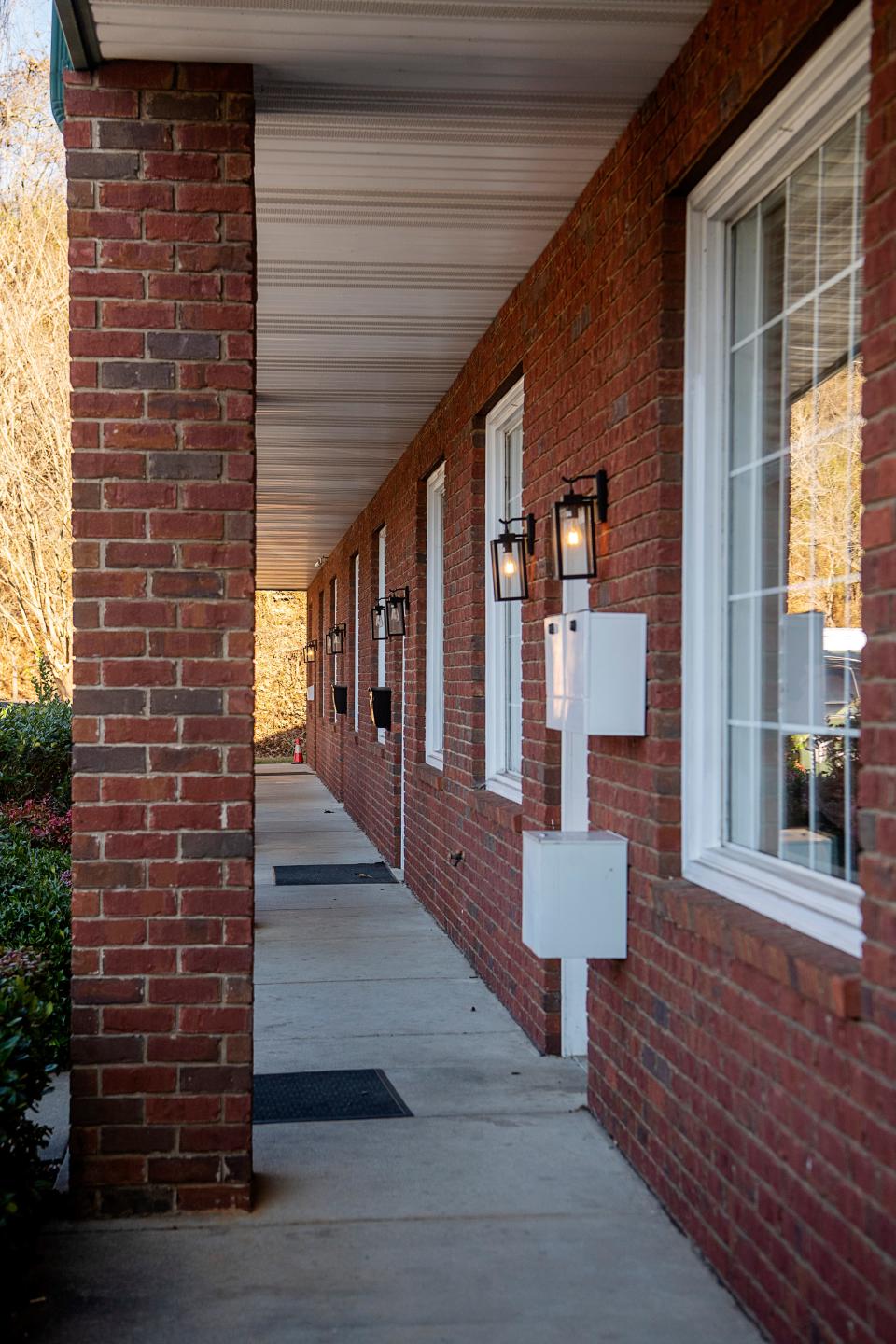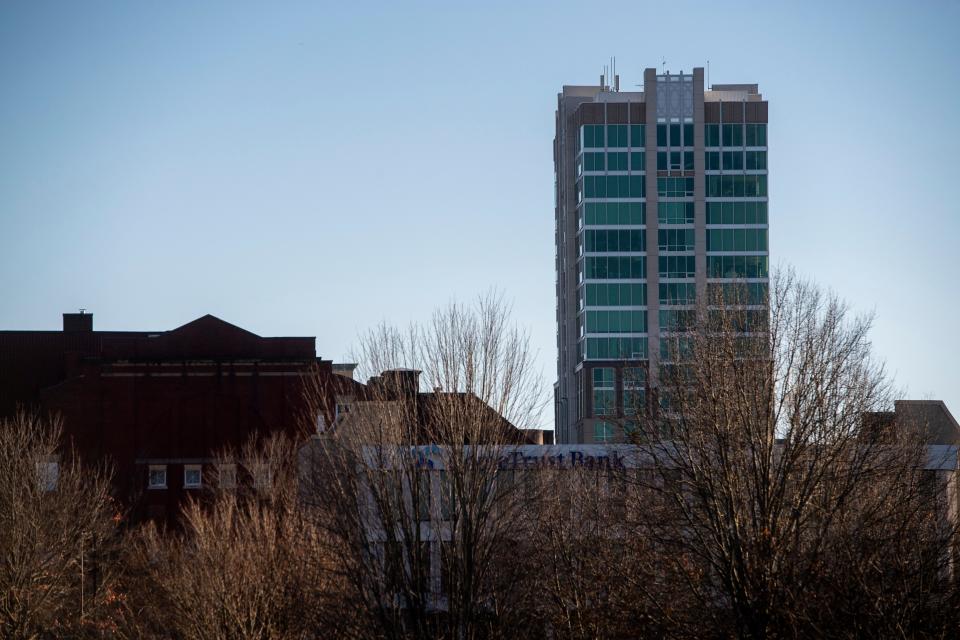Asheville-based addiction recovery provider embroiled in $46M suit; Services impacted?
ASHEVILLE - In June 2022, Jon Wood and Danny Dillow opened Asheville Detox Center as the co-CEOs of the Asheville-based management firm Health Care Alliance North America. The location is one of the only private alcohol and drug detox centers in the region.
A little over a year later, Wood is facing a lawsuit from former business associates — including Dillow — claiming misleading statements led to "unfair and deceptive" business practices after Wood and his business partner, David Glenwinkel, failed to pay over $15 million in promissory notes.
As a result, over $46 million in damages are being sought from Wood — CEO and President of Asheville-based Oasis Recovery and owner of HCANA — and Glenwinkel. Both are now the primary owners of Health Care Alliance North America, or HCANA.

Eastern Recovery Management LLC — a group of former stakeholders in HCANA — filed the lawsuit Nov. 9 in the Buncombe County Superior Court.
HCANA is a management company for nine addiction and mental health treatment centers primarily across the Southeast. In Asheville, HCANA manages Oasis Recovery Center and Oasis Recovery II, along with Asheville Detox Center, employing roughly 180 people in the area, according to Wood.
Oasis Recovery Center is located off at 191 Charlotte Street and Asheville Detox Center is located just around the corner at 25 Choctaw Street.

"Defendants, through statements from Mr. Wood and Mr.Glenwinkel, were tricked into believing that Mr. Glenwinkel had sufficient resources in his individual capacity to pay at least the ($10 million) owed under the Short-Term Note," the lawsuit reads.
"The misconduct and misrepresentations alleged above constitute unfair and deceptive acts or practices in or affecting commerce in violation of the North Carolina Unfair and Deceptive Business Practices Act codified in Chapter 75 of the North Carolina General Statutes," the suit continues.
Wood spoke with the Citizen Times about the case, stating the suit was partially the result of a capital investor dropping out at the last minute — just prior to two promissory notes being due — leading those who were owed capital from the HCANA buyout to pursue legal action as they were not immediately capable of producing the over $15 million required.
Wood and Glenwinkel operate the Wyoming-based companies Glenwood Enterprises LLC and Glenwood Real Estate LLC. Both companies are named in the suit.
Julian Wright, a business litigation attorney representing Eastern Recovery LLC, said the $46 million is the result of "treble damages" which result from the violation of North Carolina law.
"The roughly $46 million sought by our clients is the amount owed under the two notes, multiplied by a factor of three (or treble damages)," Wright said in an email with the Citizen Times. "In this case, our clients are seeking treble damages for a violation of NC’s Unfair and Deceptive Trade Practices Act."
In communication with the Citizen Times, Wright could not comment on the misleading statements provided by Glenwinkel or on ongoing litigation.
The Citizen Times reached out to Glenwinkel, but he was not available for comment by deadline.
While not directly impacting patients or recovery services, Wood said the suit has placed the company in a "vulnerable spot," where the himself and Glenwinkel have "gotten creative in continuing to make payroll."
2 different management styles; 2 experiences
Wood told the Citizen Times that the decision to buy out Eastern Recovery Management from HCANA came from a "difference in management styles."
"It was very challenging having multiple chiefs trying to run the company in kind of different directions," Wood said.
According to Wood, the conversations to buy out Health Care Alliance North America started after Eastern Recovery LLC decided against moving forward with capital requests that came along with 2023 being an "expansion year" for the company. The requests involved opening Oasis River Recovery in Oconee, Tennessee, and opening the second Oasis location in Asheville.
Eastern Recovery was hesitant to put forth the capital after plans had been agreed on to open the centers, Wood said.
"That's what triggered all the conversations that formed the buyout. Technically, in our operating agreement, there was not a specified buy-sell," Wood said. "But that's where really we asked them. We said: 'Look, either you guys have to put in the capital or we have to figure out a price that we could buy you out on.'"
Eastern Recovery Management, LLC V. Glenwood Enterprises, LLC by whofmann on Scribd
Wood had previously run the company alongside Danny Dillow, the registered CEO of Eastern Recovery Management LLC and former co-CEO of HCANA. Both say they were inspired to enter the industry after their experience in recovery.
Dillow and Wood had worked together for several years as co-CEO's HCANA, even being jointly named on a $5,000 donation to the city of Asheville to open a Merrimon Avenue bus stop in 2021. In total, HCANA has served over 6,500 clients during the company's over 5 years of business, according to the HCANA website.
Dillow's experience was similar, but came down to "pace of expansion."
"We had different views on how potential expansion of the company would proceed," Dillow said of working in HCANA.
"When we were an ownership group together, you know, one side had certain dreams and aspirations, and the other side had certain dreams and aspirations for what we wanted to do, and who we wanted to serve," he said. "And, unfortunately, those didn't match up."
The disagreements led to the buy-out conversation, Wood said, which then led to the promissory notes.
A strange investor disrupts promissory payment
Because Glenwood Enterprises did not have the capital to purchase the shares from Eastern Recovery outright, the promissory purchased the shares using promissory notes to allow for a 90-day "fundraising period," where Wood and Glenwinkel would reach out to capital investors to help buy out Eastern Recovery's stake in the company.
The two promissory notes were for $10 million and for $5.5 million, totaling around $15.5 million, according to court documents.
The agreement for the promissory notes was followed with a 90-day fundraising period, Wood said.
By the end of it, his company Glenwood Enterprises LLC, jointly managed by himself and Glenwinkel, had not gathered the capital in time for deadline, which triggered Eastern Recovery Management to file the suit.
Wood said that the situation was not the result of misleading statements or misrepresentation, but was the result of a "really weird" situation with a private investor who suddenly dropped out not long before the Sept. 29 due date.
Wood only addressed the investor by his first name: Todd.
After pushing possible capital partners aside to bring Todd on-board to invest, wire transfers from the investors began to bounce, Wood said. Even after a background check came back clean, no money came through.
"I confer those with my financial institutions. First Bank, along with Morgan Stanley, just to say: 'Is this stuff credible?'" he said of the situation. "Everyone said: 'Yes, it looks very credible.'"
"I even went as far as to do a full background check on Todd to make sure there's no funny business," Wood continued. "Because throughout the process, there was about a three week span where he sent in three different wire confirmations, and none of them actually hit. And it turns out, he didn't have full access to his trust."
Todd didn't actually have access to the final funds to invest, Wood said. Instead, they were locked up in a family trust, inaccessible for investment.
"We didn't understand his angle," Wood said of the investor. "Why make three trips to Asheville? Why meet our team, talk about marketing, talk about the future, talk about growth and spend hours and hour and hours with us when you couldn't access the funds?"
Neither Wright or Dillow could not provide comment to the Citizen Times on whether Eastern Recovery Management knew of the investor.

What do recovery services look like in Asheville?
Dillow, while being the primary manager of Eastern Recovery Management, is also involved in running Asheville Recovery Center — a local non-HCANA managed addiction recovery center not involved in the suit.
He opened the center with the belief his team "could do it better." The Asheville Recovery was modeled after the center he attended to get clean, prior to the time when it "became a factory, so to speak."
"That's where our treatment center was born," Dillow said. "We modeled it very much after that other treatment program when it was great. You know — intimate."
Asheville Recovery Center has served "thousands" of those recovering in the area, according to Dillow. Looking forward, the goal is to continue to serving the community.
"We are excited to continue to serve the community of Asheville, and keep bringing the latest technologies and the utmost level of care for our clientele," Dillow said.
For Wood, the goal is to work with Eastern Recovery to resolve the suit by paying more capital upfront to expand the period for capital fundraising.
After that, the goal is to refocus on HCANA.
"The entire year of 2024 is going to be dedicated to normalizing all the new growth, to come up with some new marketing strategies, and to get the company back to a very, very healthy spot financially to where we can start to do more for our team," he said.

Court orders highlight bank accounts, property
The lawsuit led to two bank accounts being seized by Eastern Recovery Management, according to court orders filed in November. Real estate owned by the companies was also included in the order.
Real estate in the court order included a condo unit at 7 Patton Ave. — or the Arras Hotel — which is owned Glenwood Real Estate.
Wood said his entry into recovery management came from his experience in recovery, along with his experience in real estate — through Glenwood Real Estate — which helped finance the venture into the recovery industry along with investments from Glenwinkel.
The orders have not had any impact on recovery services but made the situation "very stressful," Wood said. However, he stated he had to "get creative" in order to make payroll amid a situation that has put the company into "a more vulnerable spot."
"No employees were damaged as a result," Wood said. "We made sure of that."
More: Answer Man: How can shoppers find spaces at Asheville Trader Joe's parking lot?
More: 600,000 North Carolinians now have access to health insurance as expanded Medicaid begins
Citizen Times County Issues and Health Care Reporter Mitchell Black contributed to this article.
Will Hofmann is the Growth and Development Reporter for the Asheville Citizen Times, part of the USA Today Network. Got a tip? Email him at WHofmann@citizentimes.com.
This article originally appeared on Asheville Citizen Times: Asheville recovery firm buy out leads to $46M suit; services impacted?
